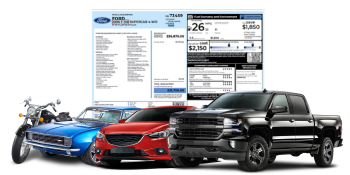Imagine buying a used car and suddenly facing a costly repair because you assumed the warranty was still valid. Understanding whether warranties transfer to new owners can save you from unexpected expenses and give you peace of mind.
The good news?
Many car warranties can indeed transfer, but the process isn’t always straightforward. In this article, we’ll explain what you need to know about transferring warranties and why checking warranty status by conducting a window sticker lookup can make all the difference.
RELATED: What is the True Cost of Car Ownership?
Understanding Car Warranties
Car warranties are like safety nets, designed to cover the cost of repairs and protect owners from manufacturing defects. Typically offered by manufacturers and dealerships, they vary widely in terms of coverage and duration. Warranties give car owners a sense of security, knowing that if something goes wrong, they’re likely covered for the repairs.
When buying a used car, however, warranty transferability becomes an important detail. Just because the car has a warranty doesn’t mean it will automatically pass on to the new owner. It’s essential to understand the terms of each warranty type to know what will or won’t transfer.
Types of Warranties That Can Be Transferred
Not all warranties are created equal, and not all are transferable. Here’s a look at the types of warranties that often transfer to new owners:
Manufacturer Warranties
These come directly from the car’s manufacturer and usually cover essential repairs and parts for a specific period or mileage. Many manufacturer warranties are transferable, particularly if the car is within its original warranty period. Most commonly, bumper-to-bumper and powertrain warranties can transfer to new owners, offering substantial coverage for repairs.
Extended Warranties
Extended warranties are optional plans purchased by the original owner, often through a third-party provider or directly from the dealership. Unlike standard manufacturer warranties, not all extended warranties transfer automatically. However, some providers allow a transfer for a small fee or additional paperwork. If you’re buying a used car, double-check with the warranty provider to see if transfer options are available.
Certified Pre-Owned (CPO) Warranties
CPO warranties apply to cars sold as “Certified Pre-Owned” by a dealership. These warranties often come with additional coverage beyond the original warranty, and they’re usually transferable to the new owner, enhancing the car’s resale value.
The Process of Transferring a Warranty
Transferring a warranty involves a few straightforward steps, but each provider may have its requirements. Here’s a general breakdown:
Confirm Warranty Transferability
First, check the warranty terms. Some warranties explicitly state whether they’re transferable, while others may require direct contact with the provider.
Gather Necessary Documentation
You’ll usually need the original warranty documentation, proof of ownership, and the new owner’s information. These documents are essential to confirm both the car’s warranty eligibility and ownership status.
Complete the Transfer Forms
Most warranty providers require you to complete a transfer form. Some may charge a small transfer fee, while others offer it as a free service. Once the form is completed and submitted, the provider will process the transfer, officially updating the warranty records to reflect the new owner’s information.
Verify Transfer Confirmation
After submitting the transfer request, follow up to ensure the warranty has been successfully transferred. A confirmation email or letter from the warranty provider will give both parties peace of mind.
Benefits of Transferable Warranties
Transferable warranties provide significant advantages for both sellers and buyers in the used car market.
- For Sellers: A transferable warranty can enhance the resale value of a car, making it more appealing to buyers. It’s a reassurance that the vehicle has been maintained under warranty, reducing potential repair worries.
- For Buyers: Knowing that a warranty transfers to you means extra protection without additional cost. Transferable warranties offer peace of mind, allowing buyers to proceed with confidence, knowing they’re covered if any issues arise after the purchase.
Tips for Buyers to Verify Warranty Status
To avoid unpleasant surprises, buyers should always verify the status and transferability of a warranty before finalizing a purchase. Here’s how:
- Contact the Manufacturer or Warranty Provider
Reach out to the original warranty provider to confirm the remaining coverage and eligibility for transfer. Many manufacturers have customer service lines specifically for warranty inquiries. - Ask for Documentation
Request documentation from the seller to verify the warranty’s existence and coverage. A thorough review of this information helps confirm that you’ll have coverage post-purchase. - Use Window Stickers Lookup
A quick window sticker lookup can give you insight into the car’s original specifications, model details, and even warranty information, if available. This helps buyers get a clear picture of what’s still covered before making a decision.
How Window Stickers Lookup Can Assist You
Window sticker lookup by VIN is an invaluable tool for anyone buying a used vehicle, especially when it comes to understanding warranty details. With a simple search, you can access the vehicle’s specifications, model features, and information that’s often tied to warranty eligibility.
This service gives potential buyers a complete look at the car’s history and helps confirm whether warranties will transfer smoothly. Having this information upfront can prevent costly surprises and ensure you know exactly what you’re purchasing.
Conclusion
Understanding car warranty transferability is essential for anyone buying or selling a used car. It ensures buyers have the coverage they expect and boosts a car’s value for sellers. Whether it’s a manufacturer, extended, or CPO warranty, knowing the transfer process and terms helps everyone involved.
Only buy your next used car after knowing the warranty status. Check the vehicle’s window sticker to verify the warranty and vehicle details, ensuring you’re covered and fully informed.
Frequently Asked Questions
What types of warranties are transferable?
Manufacturer and CPO warranties are often transferable, while extended warranties depend on the provider’s terms.
How do I transfer my car’s warranty to the new owner?
To transfer a warranty, contact the provider, complete the necessary forms, and pay any applicable fees.
Can I lose the warranty if I sell my car?
Some warranties do end upon sale, especially non-transferable extended warranties. Always check the warranty’s specific terms.









